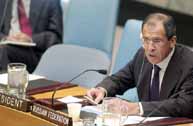Russian foreign minister criticizes of Council of Europe as delegation meets in Moscow
Russia's foreign minister repeated his country's long-standing criticism of the Council of Europe on Monday, as Moscow hosted a top-level delegation from the council's Parliamentary Assembly and took the reins of Europe's leading human rights watchdog.

Amid tension between Russia and other European nations over issues ranging from human rights to energy policy, the head of the council's Parliamentary Assembly called on Russia to demonstrate its commitment to democracy during its stint at the helm of the 46-member organization.
The council is the first major pan-European organization Russia has chaired, and comments from Foreign Minister Sergey Lavrov and other leaders indicated Moscow will use its presidency to try to tame the criticism it gets from the body it joined 10 years ago.
The council and the affiliated European Court of Human Rights has sharply criticized Moscow for rights violations in Chechnya, abuses by its police forces and infringements of media, social, religious and minority freedoms.
But Russia, the biggest financial contributor to the council, says the organization does not use the same criteria for all its members, slamming Moscow for things that go unnoticed elsewhere.
"We cannot ignore the fact that the volume of commitments that we are requested to assume is much larger than was initially addressed to 'the founding fathers' of the Council of Europe," Lavrov was quoted as saying by Russian news agencies.
"We are not making a problem out of it, but we see a certain political subtext," he was quoted as saying.
The Kremlin-allied speaker of Russia's parliament, Boris Gryzlov, singled out the European Court for particular criticism, saying: "Our task as parliamentarians is to bring attention to the fact that the European Court should solely fulfill a legal function ... and not interfere in politics."
Gryzlov, in televised comments, also urged the council and the European Union to press Latvia and Estonia to respect the rights of their Russian-speaking minorities, which Moscow says are persistently violated.
Rene van der Linden, the head of the council's Parliamentary Assembly, called PACE, said in a statement that Russia's six-month chairmanship was an opportunity "to demonstrate that it is a full part of democratic Europe, as an equal partner."
"It is now up to Russia to show that it can actively contribute to building a democratic Europe, which also includes finding peaceful solution to existing conflicts on our continent," he said, reports AP.
O.Ch.
Subscribe to Pravda.Ru Telegram channel, Facebook, RSS!


